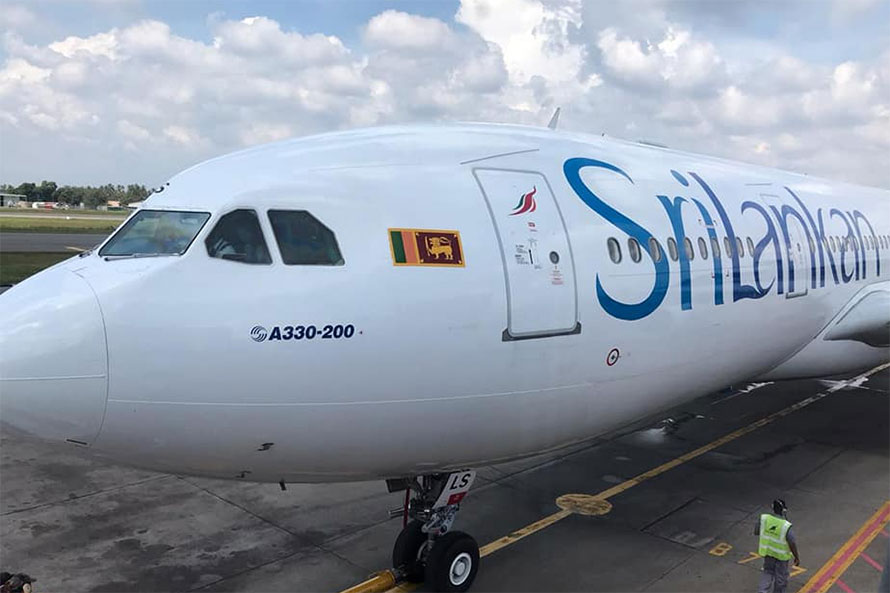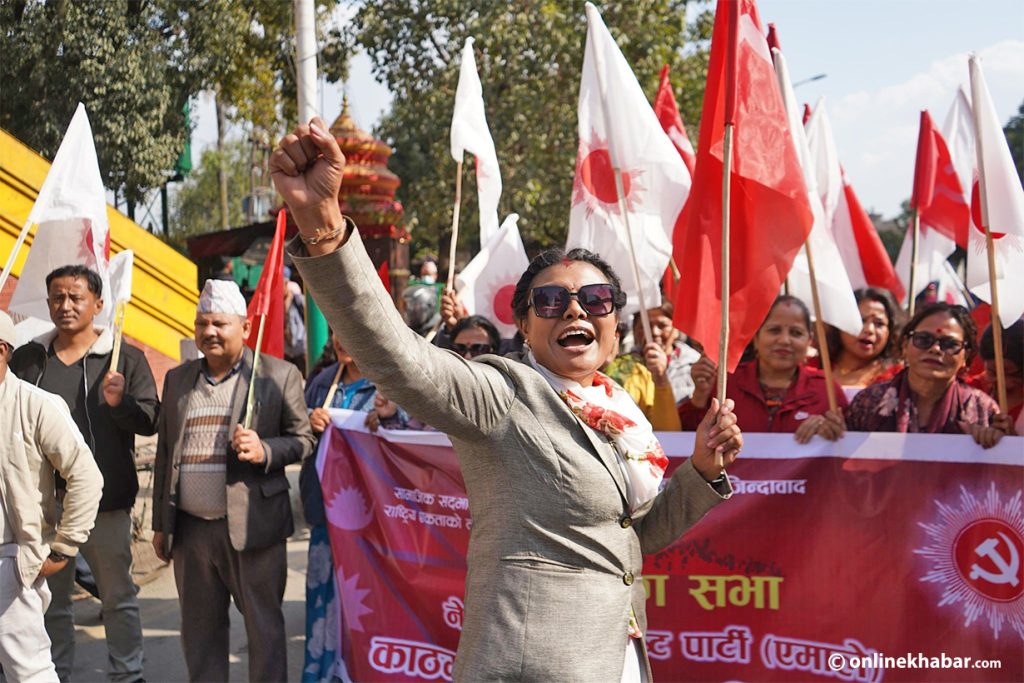
On a lazy summer afternoon, students of Balkumari Primary School in Bhaisepati, Lalitpur, are waiting for the 4 pm bell so that they can rush home and relax. Since 10 am, the kids have already seen eight boring faces come to their class, read lines from their textbook. All this is tiring.
Among those waiting for the bell are 10 children studying in grades six and seven. Their wait, however, is different. They are not eager to run home early and relax—for fun awaits them in the school itself.
Today they are to launch their improvised rocket, which they developed using Newton’s Third Law of Motion. Therefore, they are more excited than a normal day.
As soon as the workshop begins, their coach Sunil Thapa briefs them about how the ‘rocket’—made with a water bottle, a cork, some vinegar, and pencils—would lift off. Then, he shakes the bottle well and turns it upside down– the ‘rocket’s’ four legs support the whole thing. He asks the kids to wait. They wait for a couple of minutes, but the rocket stays put.
“Oh, it didn’t work,” Thapa says and shakes the bottle. After around 20 seconds, the ‘rocket’ finally shoots up and lands on the roof.
These kids play games like these for two hours every day, five days a week.
For the last two months, six boys and four girls from the school are attending an ‘after-school workshop’ run by a group of youngsters. The workshop’s aim is to familiarise students with STEAM (science, technology, engineering, arts and mathematics). Besides, they also teach computer and DIY (do it yourself) skills.
Workshops, not classes
The Dreamcatcher Nepal (DCN), a youth group which hopes to transform itself as an NGO soon, has been running the workshops. One of the founders of the organisation, Suraj Karki, says his team designed the programme after realising that traditional methods of teaching are no more relevant to the needs and expectations of contemporary children.

That is why the DCN’s workshop includes computer programming classes, art and craft sessions and scientific experiments. It is the children who learn from these workshops and their ‘coaches’ facilitate the learning process. For now, the students learn STEAM and computer for two days each–the remaining one day has been allocated for DIY.
The rocket launch session was a part of the STEAM workshop. In the computer course, they learn Java programming among other things. It is something that most of Nepali school students have never heard of.
“Our students have already learned how to create different shapes like spheres and torus using Java scripts,” computer coach Prateek Karki says, “Now, I am teaching them how to smoothen their surface.”Another coach Srishti Shrestha is teaching them how cracked bangles (churas) can be used to make dreamcatchers this week. Shrestha believes this passion can be developed into a career as well if children are really interested in it.
Not a gimmick
The youth campaigners know that their rockets will never reach the moon. One of the students has already developed a drone prototype. But, it will also never fly in the sky.
“We do not claim that we are producing scientists out of our workshops. But, we argue that basic science should not be taught from textbooks. Science has to do with day-to-day life and students should be able to connect their life with science,” says Karki.
“Today, we cannot restrict our children to course books only. The books only cannot lead the students to exciting job opportunities in the future and they end up being unskilled workers abroad,” he says, “On the other hand, the traditional courses have failed to attract kids to schools. We must change the classroom activities if we want the children to attend the classes regularly.”
He adds, “I have found that the students are not satisfied with their current lessons and they want to learn more. Personally, I conducted a survey among the students of this school, and found that many students were interested in computer games, but they did not know how to play them.”
Karki has been associated with a number of organisations working in Nepal’s education system for the past seven years. Likewise, other members of the team are also working in the sector for past few years. Now, they have come together to the DCN with a mission to implement what they learned over these years.
The current batch of students will attend the workshops for one year continuously. “But, this is not a ‘project’ with a specific deadline,” head coach Thapa says, “We will continue it as much as we can.”
The mission
The team wants to continue the programme as long as it can because their mission is not achievable in just one year.
“Our ultimate goal is to help students realise that they have opportunities to become entrepreneurs also once they complete a level of education. Of course, not everyone can develop himself/herself as an employee for others. There should be employers too, to generate jobs for them,” says Karki.
He believes all activities that the children do at the workshops lead them towards that realisation.
“Further, we want all schools of Nepal to realilse that what they have been providing currently is not a complete education. They should also learn that traditional teaching methods are no more appealing to students of the new generation because many of them want to be job creators, not job seekers,” Karki claims.
The team is aware that they are not the single group which is leading the transformation process. “We know that are many other similar organisations here and this is something that makes us happy,” Shrestha, who has learned some workshop activities from other institutions, says, “The organisations and groups should consider each other partners, not competitors.”
She says the DCN is looking forward to cooperation and partnership eagerly. “When we will be together, we have more ideas and more resources that cost less.”
Hopes on volunteerism
Achieving the mission that the DCN team has envisioned requires a lot of resources. Whereas generating resources for the smooth and regular functioning of the workshops at a single school requires thousands of rupees every year, managing all the costs for the entire transformation process is beyond the capacity of non-government organisations. The team members know it quite well.

The organisation currently does not have any dependable means of income. It has been running the workshops on donations received from generous well-wishers.
“One person has given us Rs 30,000. A friend living in the United States has donated four used laptops which have been helpful to teach students here. There are few other friends who have given some thousand rupees to the team,” Karki says, adding he has also contributed Rs 20,000 from his own pocket.
Besides collecting more money, the team is also focused on minimising expenses. Karki says the project has cost less than Rs 60,000 in total so far.
The monthly expense to run the workshops is just around Rs 15,000-20,000 in total. “We have to pay Rs 5,000 a month to the head coach [Thapa] because he works for more than two hours every day. Other instructors are volunteering because it is just two or four hours in a week,” Karki says, “Then, we have to spend up to Rs 10,000 (only) a month for children’s snacks. This is important because they are tired and hungry after school.”
In the recent future, the team also plans to launch a fundraising campaign. Shrestha says materials the children make during DIY sessions including dreamcatchers, key rings and origami products will be sold during the campaign.
“Likewise, a well-wisher from Chitwan district has proposed that we conduct winter camps for ‘rich’ students some schools there,” Karki says, “We are hopeful that we can collect Rs 50,000 to Rs 100,000 from the camps.”
The team does not want to approach INGOs and ‘big’ donors, at least for now, because it believes promoting positive changes in the community is their responsibility. The team members are certain that they will be capable of shouldering that responsibility.
“I am confident that volunteerism will sustain our organisation,” Karki says as his partner Thapa adds, “We are committed to our mission, and we have friends. Motivation matters more than money.”





















